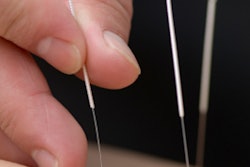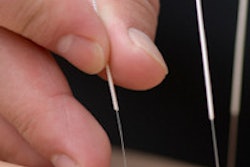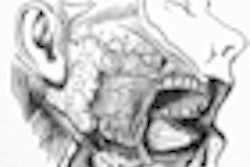When given alongside radiation therapy for head and neck cancer, acupuncture can reduce the side effect of xerostomia, according to findings from the first randomized controlled trial of acupuncture for the prevention of xerostomia (Cancer, November 9, 2011).
Researchers from the University of Texas MD Anderson Cancer Center examined 86 patients with nasopharyngeal carcinoma who had been treated at Fudan University Shanghai Cancer Center. The study included 40 patients who were randomized to receive acupuncture and 46 to receive standard of care. Those in the treatment arm received acupuncture therapy three times per week during the seven-week course of radiotherapy. Patients were evaluated before radiotherapy, weekly during radiotherapy, and then again one and six months later.
The results were based on data derived from two self-report questionnaires and measuring actual saliva flow. Patients completed the Xerostomia Questionnaire (XQ), an eight-item survey that assessed symptoms consistent with the condition. XQ scores less than 30 corresponded to mild or no symptoms of xerostomia.
The second measure, MD Anderson Symptom Inventory Head and Neck (MDASI-HN), ranked the severity of cancer-related symptoms, other than xerostomia, and their interference with quality of life. The team also measured saliva flow rates using standardized sialometry collection techniques.
"What was quite remarkable was that we started to see group differences as early as three weeks into radiotherapy for the development of xerostomia, cancer-related symptoms that interfere with quality of life, and saliva flow rates -- an important objective measure," said Zhiqiang Meng, MD, PhD, deputy chair of the department of integrative oncology at Fudan University Shanghai Cancer Center.
The largest group differences in XQ scores were seen by the end of radiotherapy, but the differences persisted over time. By one month after the end of radiotherapy, 54.3% of the acupuncture group reported XQ scores greater than 30, compared with 86.1% for the control group. By six months after radiotherapy, the numbers dropped to 24.1% in the acupuncture group and 63.6% of the control group still reporting symptoms of xerostomia. Saliva flow rates also were greater in the acupuncture group, starting at three weeks into radiotherapy and persisting through the one and six month follow-up.
Acupuncture also helped cancer-related symptoms, other than xerostomia, as measured by the MDASI-HN questionnaire, with differences that emerged in week three and continued through six months.
Further research is planned, including a large trial conducted at MD Anderson in collaboration with Fudan University Shanghai Cancer Center. Both centers will enroll 150 patients undergoing radiotherapy for head and neck cancer: 50 will receive acupuncture, 50 will get sham acupuncture, and 50 will be enrolled in a control group. Researchers will also examine saliva constituents and a number of other measures to better determine the mechanisms of acupuncture.



















